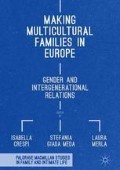Abstract
Can the circulation of care influence how women exert agency in the transformation of gender norms across generations? Based on ethnographic fieldwork and life-story interviews, this chapter sheds light on intimate power relationships within an extended family originally from a village north of Quito, with members living in Madrid. The study focuses on the effect of intergenerational and sibling dynamics on the organization of social relations within transnational families, specifically on intergenerational cooperation, power relations and their influence on managing care and the intimate at a distance.
The analysis centres on the use of ethnic boundaries in power relationships and how ethnicity is instrumentalized to negotiate gender norms, influencing the circulation of care in transnational families.
Notes
- 1.
Each of these axes divides the social subjects and situates them in different categories and social positions. As Anthias (and other feminist scholars, see for example Ortner 2001) explains, these axes are important elements of social stratification because they determine the allocation of socially valued resources and social locations (Anthias 2001: 368).
- 2.
This research is based upon qualitative data drawn from ethnographic work done towards my doctoral thesis in Social Anthropology thanks to a PhD scholarship of the Autonomous University of Madrid.
- 3.
My analysis is influenced by a research project on return migration, directed by Gioconda Herrera and Cristina Vega, in which I participated in 2013. Based on 30 interviews with different members of families of Jatun Pamba in Madrid and in Quito, the project focused on personal and family trajectories of migration and gender differences in the mobility strategies.
References
Anthias, F. 2000. Metaphors of Home: Gendering New Migrations to Southern Europe. In Gender and Migration in Southern Europe: Women on the Move, ed. F. Anthias and G. Lazaridis. New York: Berg.
———. 2001. The Material and the Symbolic in Theorizing Social Stratification: Issues of Gender, Ethnicity and Class. The British Journal of Sociology 52: 367–390.
Baldassar, L., and L. Merla, eds. 2014. Transnational Families, Migration and the Circulation of Care: Understanding Mobility and Absence in Family Life. London: Routledge.
Barth, F. 1969. Ethnic Groups and Boundaries: The Organization of Cultural Difference. Boston: Little, Brown & Co.
De La Cadena, M. 1991. ‘Las mujeres son más indias’: Etnicidad y género en una comunidad del Cuzco. Revista Andina 9: 7–47.
Echevarría Vecino, L. 2012. Gender and Conflict Within Migrant Families: A Case Study of Mothers and Daughters of Moroccan Origin in Madrid. Refugee Survey Quarterly 31: 137–160.
Espiritu, Y.L. 2001. ‘We Don’t Sleep Around Like White Girls Do’: Family, Culture, and Gender in Filipina American Lives. Signs 26 (2): 415–440.
Foucault, M. 1976. Histoire de la sexualité, Tome 1: La volonté de savoir. Paris: Gallimard.
García, F.S. 2014. Los cabos atados y sueltos en los estudios agrarios y étnicos en ecuador. Revista de Antropología Social 23: 73–89.
Gregorio Gil, C., and H. Gonzálvez. 2012. Las articulaciones entre género y parentesco en el contexto migratorio: más allá de la maternidad transnacional. Ankulegi 16: 43–57.
Herrera, G., M.C. Carrillo, and A. Torres. 2005. La migración ecuatoriana: transnacionalismo, redes e identidades. Quito: FLACSO. Sede Ecuador.
INE, Instituto Nacional de Estadística (España). 2016. Censo de Población y Viviendas del 2011 & Primeras estimaciones del padrón para 1 de enero de 2016.
Mahler, S.J., and P.R. Pessar. 2006. Gender Matters: Ethnographers Bring Gender from the Periphery Toward the Core of Migration Studies. International Migration Review 40: 27–63.
Ortner, S.B. 2001. Specifying Agency. The Comaroffs and Their Critics. Interventions 3: 76–84.
Oso Casas, L. 2000. L’immigration en Espagne des femmes chefs de famille, 89–140. Les cahiers du CEDREF.
Parella Rubio, S. 2012. Familia transnacional y redefinición de los roles de género: El caso de la migración boliviana en España. Papers: Revista de Sociologia 97: 661–684.
Pedone, C. 2008. ‘Varones aventureros’ vs.’madres que abandonan’: reconstrucción de las relaciones familiares a partir de la migración ecuatoriana. REMHU. Revista Interdisciplinar da Mobilidade Humana 16 (30): 45–64.
Suárez Navaz, L., S. Castañón Romero, and E. Anadón Moreno. 2006. La mujer indígena ante la migración: estudio de caso de una comunidad andina. Anales del Museo Nacional de Antropología 25–40.
Van Vleet, K.E. 2008. Performing Kinship: Narrative, Gender, and the Intimacies of Power in the Andes. Austin: University of Texas Press.
Zontini, E. 2010. Enabling and Constraining Aspects of Social Capital in Migrant Families: Ethnicity, Gender and Generation. Ethnic and Racial Studies 33: 816–831.
Acknowledgement
I would like to thank the people of Jatun Pamba, without whom my research would not have been possible, for sharing their experiences with me and accepting me as a (somehow peculiar) member of their families. I also want to thank the people who have read previous versions of this chapter, Maya Paltineau, Sarah Smit, Rupert Small, Maggie Schmitt, and the editors of this book for their numerous comments.
Author information
Authors and Affiliations
Editor information
Editors and Affiliations
Rights and permissions
Copyright information
© 2018 The Author(s)
About this chapter
Cite this chapter
Dallemagne, G. (2018). Intimacies of Power in the Circulation of Care: Making Gender Across Generations. Transnational Andean Families in Quito and Madrid. In: Crespi, I., Giada Meda, S., Merla, L. (eds) Making Multicultural Families in Europe. Palgrave Macmillan Studies in Family and Intimate Life. Palgrave Macmillan, Cham. https://doi.org/10.1007/978-3-319-59755-3_8
Download citation
DOI: https://doi.org/10.1007/978-3-319-59755-3_8
Published:
Publisher Name: Palgrave Macmillan, Cham
Print ISBN: 978-3-319-59754-6
Online ISBN: 978-3-319-59755-3
eBook Packages: Social SciencesSocial Sciences (R0)

